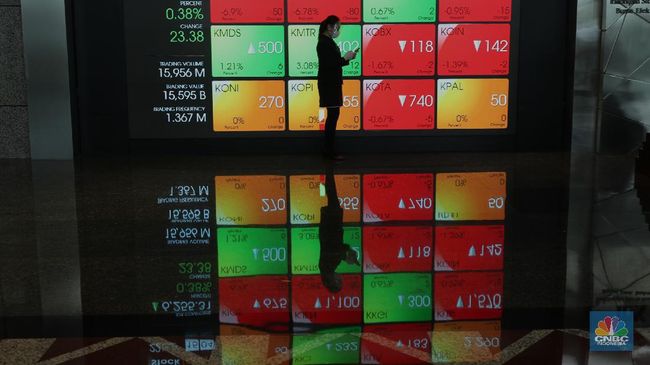Jakarta, CNBC Indonesia – Having strengthened in early trading, the Composite Stock Price Index continued to slip into the red zone until trading ended with a weakening of 0.78% to 6,199.64 points.
The rate of JCI is not in line with the majority of stock market movements in Asia which are advancing in the green zone. Nikkei Index, Japan, for example, strengthened 0.99%. There were also gains on the Hang Seng stock exchanges, Hong Kong and Straits Times, Singapore by 0.81% and 1.22%, respectively.
Head of Research of PT Samuel Sekuritas, Suria Dharma, said that the weakening of the JCI was due to pressure from the weakening Rupiah exchange rate amid the sentiment of rising yields on US bonds (US Treasury).
Trading data on the Bloomberg spot market shows that the Rupiah exchange rate has weakened to a position of Rp 14,405 per US dollar.
“The JCI weakening was due to the depreciation of the Rupiah and concerns of rising US bond yields. The JCI is quite sensitive to the depreciation of the Rupiah,” said Suria Dharma, when contacted by CNBC Indonesia, Tuesday (9/3/2021).
Not only that, the cause of the weakening of the JCI was also due to the large selling action of foreign market players, which amounted to IDR 782.69 billion. Some of the shares released by foreigners were quite large, among others, PT Bank Central Asia Tbk (BBCA) at Rp 497.1 billion, PT Bank Rakyat Indonesia Tbk (BBRI) at Rp 189.8 billion and PT Vale Indonesia Tbk (INCO) at Rp 81 , 8 billion.
“The foreign net sell is quite large today,” said Suria.
Meanwhile, other positive catalysts in the country, such as the Bank Indonesia consumer survey in February which indicated an improvement to 85.8 compared to January’s 84.9 position, was not sufficient to sustain the increase in the JCI.
PT MNC Asset Management’s stock market observer, Edwin Sebayang, said the stock market was hit by selling pressure again this Tuesday.
“The fall in the Rupiah exchange rate against the US Dollar and the increase in bond yields in both the US and Indonesia put the JCI under selling pressure,” said Edwin Sebayang.
Meanwhile, previously, the previous selling action occurred in the commodity market which caused several commodity prices to experience contraction, such as world oil, gold, coal and tin and the quite varied movements of the Wall Street index.
(roy/roy)
– .


